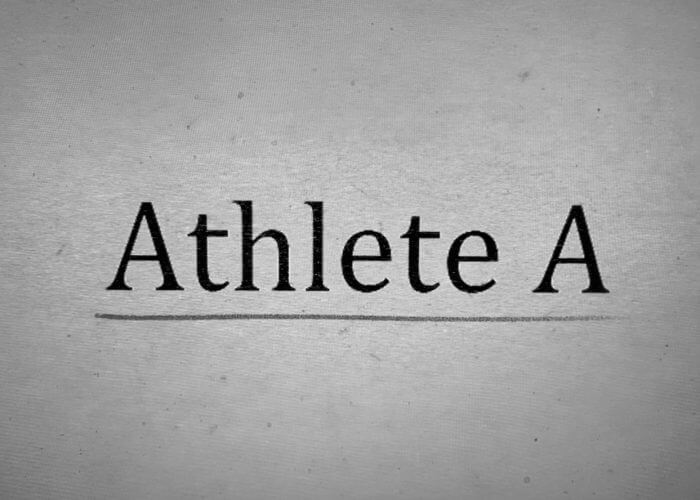U.S. Senate Passes Powerful Olympic Reform Legislation With Unanimous Vote

The end of the autonomy of Olympic governance is nigh: the United States Senate unanimously passed transformative Olympic reform legislation late on Tuesday, granting Congress the power to dissolve the United States Olympic and Paralympic Committee (USOPC) Board of Directors. The powers extend to decertifying National Governing Bodies (NGBs) of individual sports if federations are deemed to have failed to represent the best interests of athletes.
The Empowering Olympic, Paralympic, and Amateur Athlete Act (S2330), which now goes to the House of Representatives for final approval, transcends its towering American context.

Athlete A – Photo Courtesy: Netflix
In the United States, the need for Olympic reform legislation has grown out of anger and frustration over what has widely been seen as unchecked abuse of athletes, sexual, physical and psychological, at the heart of Olympic sports. The issues are highlighted in the documentary Athlete A but date back much further to cases reported in the 1970s but ignored for decades.
Abuse is a worldwide crisis in sport and unfolds in a largely autonomous bubble of Olympic governance, in which authorities serving as guardians and regulators have been accused of failing to take responsibility for events that unfold on their watch, including various forms of abuse, doping in the mix.
Power of states to eject those at the helm of national Olympic committees has been fiercely resisted by the International Olympic Committee (IOC), with nations such as Kuwait suspended from the Olympic Movement when its Government sought to exercise control over Olympic matters, including calls to replace key power-brokers at the heart of the IOC.
Events surrounding the second suspension of Kuwait from the Olympic Movement in 2015, highlight the issue of Olympic autonomy and how that sits with the right of states to say who represents them in international forums (fora).
Upon suspending Kuwait in 2015, the IOC stated:
“The Olympic Movement in Kuwait has faced a number of issues to preserve its autonomy, in particular due to recently amended sports legislation in Kuwait.”
The new legislation in the United States grants democratically elected politicians the power to determine who represents the country and its athletes at the helm of the Olympic Movement in the United States, the power to decide if those in charge are fit for purpose and following the laws and standards set for all citizens of the country. The priority issue in focus: the protection and welfare of athletes, Olympic sports underpinned by a massive worldwide community of children.
S2330 Olympic reform legislation makes provision for whistleblowers and renders retaliation a crime.
The Act was founded in the hard work and courage of victims and their advocates, its importance to Olympic sport hard to overstate, say the architects of S2330.
Calls for the Senate to back the Olympic reform legislation included a Who’s Who of Olympic medallists in swimming, alongside some swim coaches and supporters.
Nancy Hogshead-Makar, the 1984 Olympic 1500m freestyle champion, helped frame the Act as co-chairman of team Integrity, the committee of Olympians and member of the American Olympic community advocating for an overhaul of the USOPC. Hogshead-Makar told reporters:
“This bill is a repudiation of the USOPC board’s adoption of a ‘money and medals’ corporate culture. This bill gives athletes far more rights, while holding the corporation to a higher standard of care for the athletes compromising our youth sports, feeder sports and elite sports programming. … I am grateful that after many years of bipartisan collaboration, this legislation will benefit those participating in the U.S. Olympic Movement. The Olympics are a unique treasure for us. Striving for excellence, to be the best-of-the-best, reflects our American identity … Our quest remains: to fix a broken sport governance system on behalf of those most vulnerable in the Olympic Movement, and those most impacted by the Sports Act. These legislators answered the call. I look forward to working collaboratively to assure that athletes are equal stakeholders in USOPC governance.”
The bill now goes to the U.S. House of Representatives. Team Integrity released a statement calling on the House to follow in the footsteps of the Senate.
“The Committee to Restore Integrity to the USOPC and U.S. Olympians and Paralympians Unbroken applauds the Senate for passing legislation designed to reshape the governance of the Olympic Movement so that the corporation, the USOPC, has enhanced oversight and accountability, and that athletes have far greater rights,” the release stated.
“In a strong showing of bipartisan support, the Senate passed S. 2330 by Unanimous Consent. We urge the House to immediately take up the bill and bring it to the floor under suspension of the rules to expedite House passage and send the bill to the President’s desk.”
The Olympic reform legislation requires the USOPC to contribute $20 million annually to the operation of the U.S. Center for SafeSport. In 2019, the NOC contributed $7.5 million. As the Orange County Register reports, that contribution is “some $300,000 less than the $7.8 million the USOPC paid to Jet Set Sports, a New Jersey firm specializing in Olympic-related corporate hospitality, according to financial records”.
NGB exemption from decertification in bankruptcy proceedings is brought to an end by the new Act, which calls for the creation of 16-member commission on the state of the USOPC and American Olympic movement. Congress will select the members of the commission, with a requirement that at least eight members must be current or former Olympic or Paralympic athletes.
USOPC CEO Sarah Hirshland welcomed the legislation. In a statement, she said:
“We would like to thank Chairman Moran and Senator Blumenthal for their work in drafting and advancing this important legislation. It will cement increases in athlete representation in the U.S. Olympic and Paralympic movements, improvements in athlete safety protections, and increases in transparency and accountability in our system. The USOPC board recently approved the second phase of the most sweeping governance reforms in recent history. Building on that commitment and this legislation, we will move rapidly to implement reforms to address any outstanding provisions from this bill.”
Hirschland and others face questions over financial records released on Monday by the USOPC showing that the organization spent nearly $20 million more in 2019 on its employees than it did on direct financial support to American elite athletes. The accounts showed that nearly $26 million was spent by USOPC in legal-process related expenses in 2018 and 2019, after $667,300 were paid out in legal expenses in 2017. The 2019 lobbying bill for USOPC was $180,366.
Joy Over Bipartisan Support For Safeguarding Through Olympic Reform Legislation

The Olympic Rings – Photo Courtesy: Pixabay
News of the unanimous Senate vote was received with joy by those who fought hard for the protection of athletes to be enshrined in law.
Among them is Dia C. Rianda, who was forced to walk a tightrope of official resistance and legal threat after reporting the abusive behaviour of a coach in California. Today, Rianda tells Swimming World:
“This news gives me hope in humanity. This is the beginning of the End of the Olympic Movement as we have known it in the USA and it is a good thing.
I worked so very hard to get this passed, as did a few others. ‘Passed Unanimously’. I’m hopeful for the future, but there is still so much more work to be done.”
“The message is now crystal clear now – ‘If you are an abuser, exploiter of athletes, an abuse enabler, part of coverup and silencing athlete / child / victims it is time to go. There will be no place for you in the future of Olympic Sport and history will not remember you kindly even as you take credit for athlete successes.”
She added: “For the first time in 8 years I feel hope in my heart for athletes in the Olympic Movement.”
Rianda lamented that more coaches had not signed up to the process of backing and supporting the Act but the job now almost done as far as getting the Olympic reform legislation on the books, she noted that the pathway to progress required stakeholders to play an active role in forcing change:
“I spoke up loudly. I reported and I openly advocated. I paid a heavy price for that but that price was worth every tear and all the crap I have experienced because things are changing in my country for better for children who aspire and work for the Olympic Dream. The price albeit high was worth a better future.”
Rianda noted one of the most heartening aspects of the Olympic reform legislation: Bipartisan support. In other words, no hiding place behind any political flag or colour; surround-sound support for the empowerment and protection of athletes in law, the notion of Olympic autonomy beyond the law of the land whacked out of the park.
Hailing bipartisan support and backing for the Olympic reform legislation as a great moment for athletes, for those who support their right to work in a safe environment that affords them protection from rogues, Rianda recalled the long road of campaigning and the work of Senators:
“When I met with Richard Blumenthal and his aides I felt sincere empathy and they took much time to listen and ask questions. He and Jerry Moran showed extreme care and respect for athletes speaking up. They were not the only ones. Many on both sides of the political spectrum on the House side showed extreme interest and concern. I don’t think there will be any issue of this clearing the House of Representatives.”
The new Act brings pressure to bear on Olympic sports federations who have lent on legal advice designed to represent and protect them, as opposed to the athletes and survivors of abuse – in some cases with obvious push-back against those coming forward with allegations. Victims and the advocates will now have a law to lean on.
The Power To Dissolve NOC Board & Decertify NGBs
The Empowering Olympic, Paralympic, and Amateur Athlete Act places far greater legal liability on the USOPC and NGBs for sexual abuses by coaches, officials and employees than has existed to date.
It also provides Congress with mechanisms to dissolve the USOPC’s board of directors and decertify NGBs, groups that Congress and athletes allege have put Olympic success and attracting corporate sponsors over the safety and welfare of athletes.
The Olympic reform legislation is designed to transform the toxic culture within American Olympic sports that enabled and then ignored sexual abuse of the kind seen in the case of Larry Nassar in gymnastics but suffered by victims working with predatory coaches and officials in sports far and wide, swimming included, as USA Swimming list of the permanently banned.
That list is incomplete as far as survivors and advocates are concerned as they ponder the vexed question of historic abuse and allegations of abuse that went unheeded for decades.
Among outstanding cases is that of coach Paul Bergen, accused of sexual abuse of minors by the women who trained in his programs as teenagers in the 1970s. The abuse was first reported to police authorities in the 1970s and the predecessor, in name, of USA Swimming. It came up again during meetings of USA Swimming’s Abuses Committee in 1991 but never resulted in any inquiry nor action. Allegations of abuse by Bergen have been widely reported since Deena Deardurff made an excruciating and damning statement in 2010 confirming what she had told others in the sport on many occasions down the years.
“Critical step towards providing effective safeguards and protections”
U.S. Senators Jerry Moran (R-Kansas) and Richard Blumenthal (D-Connecticut), the Olympic reform legislation bill’s sponsors, issued s statement saying:
“Today’s Senate passage of our Olympic reform legislation marks a critical step towards providing effective safeguards and protections to Olympic, Paralympic and amateur athletes pursuing the sports they love. We could not have passed this bill in the Senate today without the input and guidance of the survivors – athletes who traveled to Washington countless times, shared their stories and demanded change. While powerful institutions failed these survivors in the past, we aren’t going to.”
The legislation was introduced in July 2019 in response to the Nassar case. After the unanimous vote on Tuesday, Sen. Blumenthal told reporters:
“Larry Nassar became the face of a pattern of systemic failure and abuse and he reflected a culture of putting medals and money above the lives of athletes, prioritizing those tangible signs of victory above the human lives that were impacted so adversely.
“Systematic failures were reflected in Larry Nassar’s success in terrorizing these young athletes and it affected other trainers, other coaches who similarly betrayed trust, it affected other sports, figure skating and swimming as well as gymnastics. None were immune to this sexual, physical or emotional abuse.”
The Bill’s passage follows an 18-month Senate investigation into abuse in Olympic sports sanctioned by the USOPC, a Colorado Springs-based tax exempt, non-profit organisation.
“Sen. Moran and I heard again and again and again that the USOPC and NGBs have failed their athletes at every turn,” Blumenthal said.
“Men and women in these organizations knew what was happening. They did nothing. They already had a legal duty under the law to report what was going on, clearly laying out in the law what should be obvious, that you must report allegations of sexual misconduct involving minors was not enough for them. They betrayed not only their trust with these athletes but their legal and moral responsibility.”
Companion legislation has been introduced in the U.S. House of Representatives by Rep. Ted Lieu (D-California) and others. House supporters hope to pass the bill by the end of the year. The moment could come as soon as September, according to media reports in the United States.
The Olympic reform legislation requires the USOPC to assert greater oversight of the NGBs and provides the USOPC with bigger weapons to discipline federations judged to have failed when it comes to protecting athletes. The Bill obliges the USOPC to establish clear procedures and reporting requirements on abuse.
Athletes are also guaranteed a third of all NGB governing structure presence under the bill.
Questions Over Olympic Governance Autonomy
The Olympic reform legislation in the United States brings into focus the wider world of Olympic governance and accountability to stakeholders.
FINA, the international swimming federation, backed the IOC suspension of Kuwait with its own but did not extend that to the Kuwaiti member of the ruling Bureau, Hussain Al-Musallam, who next year will stand unopposed for the FINA presidency as the latest head of the federation who hails from a country with no world-class swimming program back home.
Al-Musallam and his fellow Kuwaiti and boss at the Olympic Council for Asia (OCA), Sheikh Ahmad al-Fahad al-Sabah, were cited by the United States Department of Justice in 2017 as co-conspirators to fraud in the guilty-plea case of Guam soccer official Richard lai, who received more than $800,000 in payments from a bank account said to be in the sole control of the two Kuwaitis.
When Kuwait’s swimming federation sought to remove Al-Musallam from candidacy for office at FINA in 2017 – in accordance to its right as a member federation – FINA’s leadership rejected the plea on grounds that the nation was suspended. Instead, as time of Kuwait’s suspensions it pressed ahead with an election that saw a Kuwaiti official confirmed as “first vice-president” of the organisation.
Related complaints made to the FINA Ethics Panel at the time highlighted the lack of independence in the integrity process at the swimming federation.
The IOC has urged FINA to move to a system akin to that World Athletics has adopted, the establishment of the Athletics Integrity Unit having established an independent body open to hearing complaints of stakeholders without the risk of interference from federation officials.



